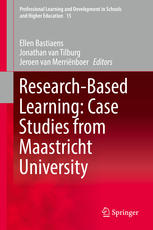

Most ebook files are in PDF format, so you can easily read them using various software such as Foxit Reader or directly on the Google Chrome browser.
Some ebook files are released by publishers in other formats such as .awz, .mobi, .epub, .fb2, etc. You may need to install specific software to read these formats on mobile/PC, such as Calibre.
Please read the tutorial at this link: https://ebookbell.com/faq
We offer FREE conversion to the popular formats you request; however, this may take some time. Therefore, right after payment, please email us, and we will try to provide the service as quickly as possible.
For some exceptional file formats or broken links (if any), please refrain from opening any disputes. Instead, email us first, and we will try to assist within a maximum of 6 hours.
EbookBell Team

0.0
0 reviewsThis book describes lessons learned from the implementation of research based learning at Maastricht University. Well-known for its problem based learning (PBL) educational model, Maastricht University implemented research-based learning (RBL) as a new educational concept in addition to PBL, around 2009. The model has taken the shape of an excellence programme offering third-year bachelor students an opportunity to conduct academic research together with academic staff. The introduction of the research-based learning concept into the programmes of all Maastricht University’s faculties has resulted in a range of RBL models that vary to fit the various disciplines and programmes offered by the faculties. The book first presents theoretical models and a description of the concepts of research-based learning and undergraduate research (UGR). Next, by means of case studies, it describes the formulas developed to suit the various programmes, the challenges encountered, the initial reservations on the part of the staff, the limitations caused by regulations and demands of the curricula, as well as the successes and results of the excellence programme. The disciplines described in the case studies include psychology and neuroscience, knowledge engineering, social and cultural sciences, law, and business and economics.